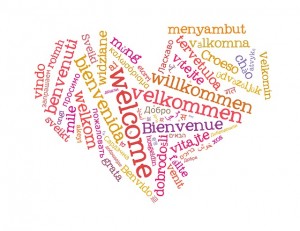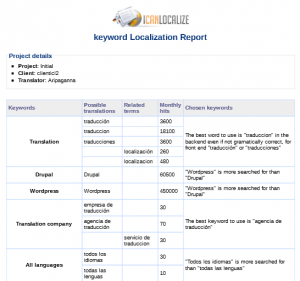
A key part of website localization is ensuring that you are using the best keywords for your target language and culture; that your content is going to be relevant and reflect what your potential audience and customers are going to be searching for.
ICanlocalize, the translation service provider, the same development group as WPML, offers a great Multilingual SEO service . They research and target the most relevant keywords in the foreign languages to ensure the best SEO for your multilingual site.
What makes a good keyword to ensure best SEO?
There are two broad groups of Keywords:
- General keywords are going to be very popular and have a lot of competition. If you are running the only eCommerce store for Mangoes on the planet, then “mango” could be the keyword for you.
- Specific keywords are going to attract a smaller audience, but they can be much more focused on your business or product and face much less competition than more general terms. Also, when a potential customer arrives at your site and finds exactly what they have searched for, they are more likely to convert into a real customer.
Our general “mango” search, could become “florida keitt mango” if that is the variety and location we are selling. We are going to get less traffic, but it is going to be of much higher quality.
The most important thing about your keywords, is that they need to reflect the search terms your potential customers are going to be using AND as importantly, they need to be reflected in your site content.
Identifying keywords is not enough – content is king
Gone are the days when a dozen keywords and a competent programmer were a good SEO solution. Today content is king. It’s your site’s content that is going to win you traffic and customers and that’s where your keywords need to be.
Perhaps, going back to our mangoes, we should have a title on our page Where to buy keitt mangoes in Florida?
This is the sort of term we can expect users to be searching for, and we don’t have to settle for a warm feeling about it, we have a set of tools at our disposal to find out how often that phrase is being used, from where, the competition for it, and how its use is evolving.
Multilingual SEO – the process
Multilingual SEO is not just a question of translating the keywords for your source language. Your localized site’s keywords need to be as relevant to the target language audience as the original version, and they need to be part of, or rather, weaved into, the target language content of your site.
1. Identifying source keywords
You know your business best, so we will ask you to list the keywords you would like us to localize. If you want, the translator can help you identify keywords for your source language.
2. Identify target language keywords, keyword alternatives and associated search volumes
The translator will carry out research based on your website content and the source language keywords provided. We use, and recommend the use of the following tools for keyword identification:
- Google’s keyword planner – research keywords and get statistics and traffic estimates.
- Google trends – relative search volumes. Volume by region and language. Term trending.
3. Weigh alternative keywords and recommend final keyword choice
The translator will consider related terms that people can type when searching for your product/service with an emphasis on semantic relevance. The top keywords locally could be anything: colloquialisms, synonyms, abbreviations, adopted terms from another language, etc.
They will compare search volumes of candidates and and determine the best candidate in the context of your site.
4. Determine the title and meta-description for your page
The <title></title> tag of your page continues to be one of the most important places for your keywords to appear. You’ll get a title tag recommendation based on the selected keywords for your page – this will take into account: length (a useful limit of 70 characters), keyword positioning, readability and impact. And a meta description that is target language optimised for click through and an optimum length (around 155 characters).
Google uses the title tag and meta description to build the listing on the search engine results page (SERP). We’ll make sure your SERP listing is optimised to drive as much traffic as possible to your site.
5. Generate the Keyword localization report
The results will be summarized in the Keyword localization report. This will detail possible translations, semantically meaningful alternatives, expected monthly hits for each and a recommended localization for each of the presented keywords.
Next steps
If you’ve contracted keyword localization as part of a site translation, then the translator will optimize your content for the identified keywords, ensuring content and page title relevance for the selected keywords.
This is a key step to make sure that Google is going to agree with your choice of keywords.
Three steps to site happiness:
- Having a great website.
- Having a great localized website.
- Having a great localized website that people can find.
Want to hear more about our professional Multilingual SEO service?
Head over to the ICanLocalize site and Get Started – Risk Free



